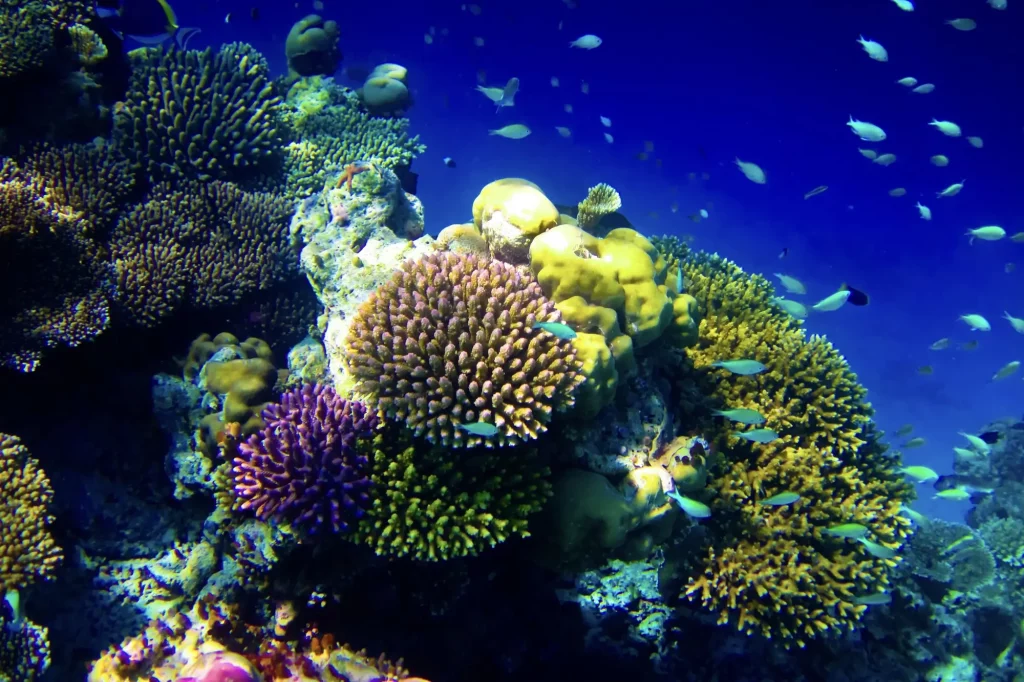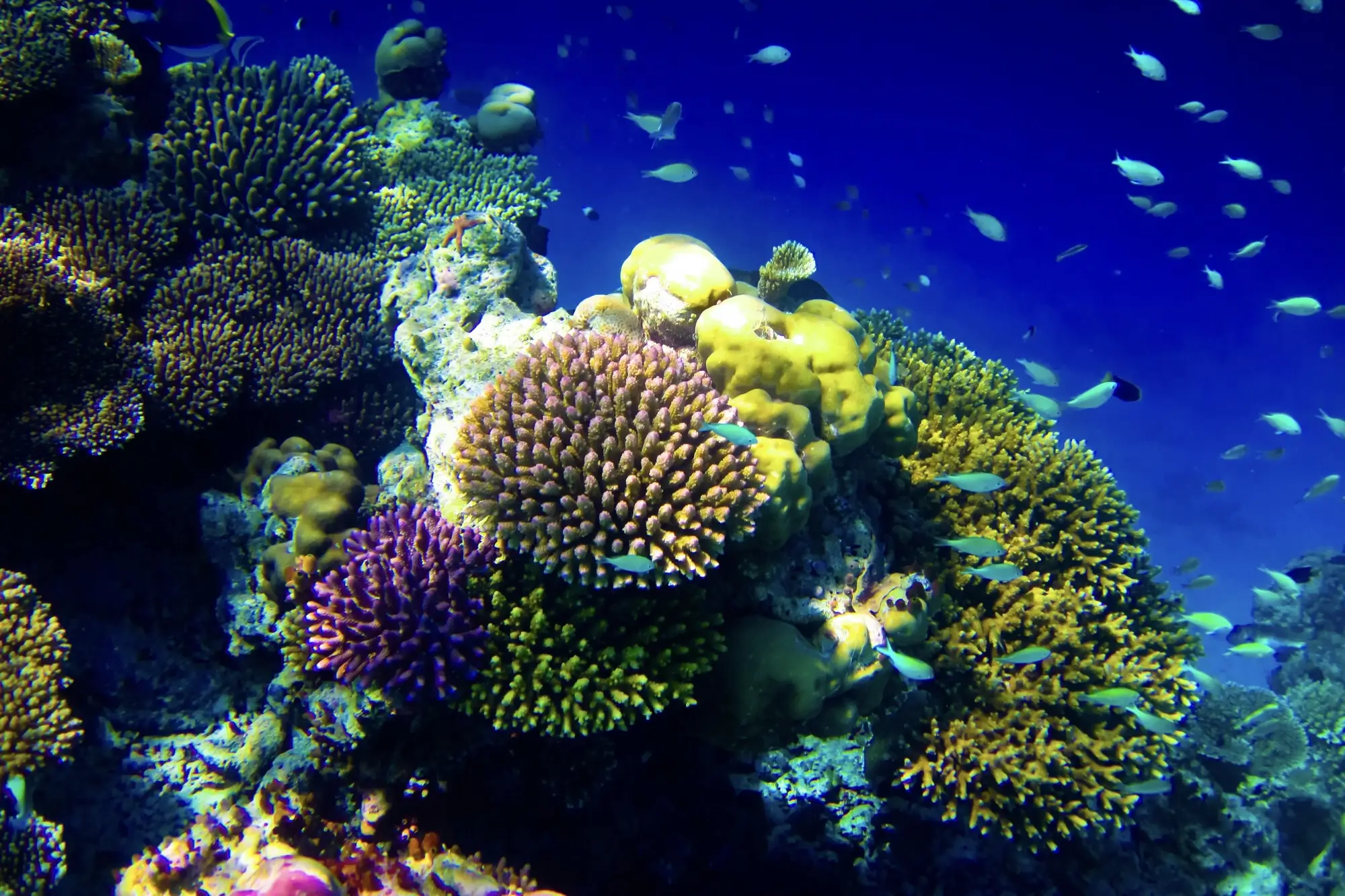Imagine the hustle and bustle of New York City – now plunge it underwater. You’ve just pictured a coral reef, an underwater metropolis bustling with life.
These complex structures, formed over thousands of years, are home to countless marine species. Much like a city’s infrastructure supports its population, coral reefs provide vital support to marine biodiversity, and, perhaps surprisingly, to us land-dwellers as well.

How Coral Reefs Benefit Humans
Coral reefs are often referred to as the rainforests of the sea. Consider this: while they cover less than 1% of the ocean floor, they support an estimated 25% of all marine species. From the tiniest plankton to the majestic sea turtle, reefs are crucial for marine life. But it’s not just fish that rely on these colorful coral cities; we do too.
Medical Breakthroughs: Nature’s Pharmacy Under the Sea
Cailin Jordan, a researcher of biological science, highlights the reefs as an untapped frontier for medical discovery. Over millennia, these organisms have developed potent chemical compounds to protect themselves from predators and disease.
The defensive compounds produced by coral reef inhabitants are not merely toxins but potential keys to unlocking new treatments for human ailments. These natural substances are part of a delicate ecological balance, serving as deterrents against predators, competition for space, or infection from parasites and bacteria.
These compounds, once harnessed, could revolutionize modern medicine, offering treatments for everything from chronic pain to Alzheimer’s disease.
In a world where we’ve grown accustomed to land-based resources, the ocean’s depths present a new frontier teeming with organisms that offer groundbreaking potential for medicine.
Our quest for health might just depend on the survival of these underwater metropolises.
For instance, certain corals secrete compounds that fight off invasive bacteria and fungi, pointing the way toward novel antibiotics at a time when antibiotic resistance is a growing global concern.
Yondelis and Cytarabine are just the beginning when it comes to pharmaceuticals plundered from the depths. With recent advances, such as the synthetic mimicry of bryostatin 1, we’re on the brink of a medical renaissance, if only we can protect these precious ecosystems from threats like climate change.
The coral reefs’ role as a largely unexplored frontier teeming with organisms that offer potential for medicine is becoming increasingly recognized. They are the 21st century’s medicine cabinet, harboring solutions for some of today’s most pressing health challenges. The early antiviral drugs Ara-A and AZT, and the anticancer agent Ara-C, are testaments to the treasures that Caribbean reef sponges hold. And who could forget the pain relief drug developed from cone snail venom? It’s as if every crevice of the reef ecosystem hides a potential prize.
Yet, for all their worth, these underwater rainforests are often overlooked by policymakers and the public alike.
The future of coral reefs is, in many ways, linked to our own — and it is a future worth fighting for.
Cultivating Sustainable Practices in Sea Exploration
The process of identifying and extracting these natural compounds is complex and resource-intensive. Traditional methods involved large-scale, random collection from reefs, pose significant ecological risks. Today, the focus is on sustainable practices and innovative technologies for efficient and responsible bioprospecting.
International cooperation, involving scientists, resource managers, and industry, is essential for developing management strategies that ensure the sustainable harvest and conservation of marine resources.
Commercialization of compounds derived from coral reefs could drive economic growth and incentivize the protection and sustainable use of these resources.
To capitalize on the potential of marine bioproducts without depleting resources or disrupting ecosystems, a balanced approach is necessary. This includes controlled collection, innovative screening technologies, and exploring alternative sources for valuable compounds.
A focus on sustainable management of coral reef biodiversity is critical. Less than 10 percent of this biodiversity is understood, and unsustainable exploitation poses a grave threat to these ecosystems.
To make sure we can keep finding new medicines from the ocean without harming it, we need to encourage investment, create strong partnerships, and use technologies that don’t damage the environment.
Andrew W. Bruckner, a renowned coral reef ecologist, emphasizes the vast potential of our oceans in this quest: “The prospect of finding a new drug in the sea, especially among coral reef species, may be 300 to 400 times more likely than isolating one from a terrestrial ecosystem.”
Reefs Are The Economic Lifeline of Coastal Communities
Coral reefs, known for their stunning beauty and biodiversity, are also critical economic pillars. Beneath their vivid structures lies a foundational support for fisheries and tourism industries, essential for both global and local economies. Impressively, the livelihoods of over a billion people, or about 13% of the global population, are closely connected to the health of these marine ecosystems. People living in coastal areas near coral reefs find their day-to-day lives and economic stability directly linked to the reefs’ condition.
In these communities, the well-being of the people is deeply connected to the health of the reefs. Fisheries depend on the intricate habitats coral reefs provide, supporting fish populations that feed millions and drive the economies of coastal nations. The beauty of coral reefs also attracts numerous tourists each year, fueling a thriving industry that supports local communities and encourages cultural exchange.
The fishing industry owes much of its prosperity to the health of coral reefs. The bounty they provide feeds millions and lines pockets just as surely as a rich harvest on land.
This economic impact is strikingly evident in places like Australia, where the Great Barrier Reef is not just a natural marvel but also a significant economic contributor. With over 60,000 jobs and a contribution of over $56 billion to the economy, the reef highlights the substantial economic importance of coral reefs.
However, this is just part of their global economic contribution. As populations in coastal areas grow, often more rapidly than the global average, the importance of coral reefs in supporting and enriching human communities becomes increasingly vital.
Their role goes beyond simple metrics of employment and revenue; they are foundational to marine industries, protectors of coastal traditions, and maintainers of a vital balance between the natural environment and human well-being. In recognizing the economic value of coral reefs, we see not only numbers and data but also the essential support systems for a billion people, underscoring the invaluable role these ecosystems play in our collective economic health.
Why Coral Reefs are Important to Fish
Shift the focus to the aquatic residents of these reef cities, and it becomes clear that coral reefs are to fish what cities are to humans: centers of activity, resources, and growth.
Nurseries of the Sea: Sustaining Marine Life
These ecosystems are not just homes to fish; they are the bedrock upon which the marine food web is built. They are the classrooms where young fish learn the ropes of survival before heading into the open ocean. The value they offer extends well beyond their stunning visuals — they are indispensable for the life cycles of a quarter of all marine species.
Healthy coral reefs are vital for fisheries and our economy. Approximately half of all federally managed fisheries depend on coral reefs. NOAA Fisheries estimates that the annual commercial and recreational value of U.S. fisheries from coral reefs is $100 million each. Coral reefs serve as habitat for many important fish, shellfish, and other invertebrates that are targeted for fishing.
Coral reef fisheries provide income, food, and recreation, and support ecological functions such as herbivory, which in turn supports reef health. It is essential to communicate to stakeholders why coral reef fisheries are valuable and in need of management.
Guardians of Ecological Balance
Reefs are the environmental stewards of the ocean, performing tasks from cleaning the water to cycling nutrients. Their presence ensures the health of our oceans, and by extension, the health of our planet.
- Cultural Icons: Woven into the Fabric of Societies
Coral reefs are not just biological or economic assets; they are cultural icons. For coastal communities, they are part of their identity, their heritage, and their way of life. They are the ancient monuments of the sea, as historically significant as any castle or temple on land.

- Boosting Local Economies and Tourism
The relationship between coral reefs and the tourism industry is akin to that of bees to flowers. Without the vibrant and diverse ecosystems provided by coral reefs, the allure of tropical destinations would diminish, akin to a garden without its colorful blooms.
Natural Defense Systems: How Coral Reefs Protect Coastlines
Coral reefs are standing guard over our coastlines, they offer protection from erosion, storms, and floods. Their structures dissipate wave energy, protecting our shores from erosion and storm damage. They are natural fortresses that safeguard our homes and habitats.
Much like a moat protects a castle, coral reefs defend our coastlines. Their loss would not only be an ecological disaster but a direct threat to the security of coastal communities.
- Cost-saving on Infrastructure
By acting as natural breakwaters, coral reefs save us billions in infrastructure costs. Without them, the price tag for coastal defenses would skyrocket, burdening economies and taxpayers alike.
- Environmental Indicators
Coral health is the ocean’s pulse, signaling the state of our marine environment. They help us monitor the effects of climate change and ocean acidification, serving as a barometer for the overall health of our planet.
The Threats to Corals
Coral reefs are facing an onslaught of threats, from pollution and destructive fishing practices to the impacts of climate change. Each of these challenges compounds the others, creating a perfect storm that threatens to overwhelm these delicate ecosystems.
- Human Impacts and Conservation Measures
The hand of humanity weighs heavily on coral reefs. Our actions on land have far-reaching consequences beneath the waves, from the runoff that smothers reefs in algae to the rising temperatures that trigger mass bleaching events.
Conclusion
As we surface from this deep dive into the world of coral reefs, let’s carry with us the knowledge of their incalculable value. They are more than just picturesque landscapes for divers or backgrounds for documentaries. They are crucial to our ecosystems, vital for our economies, and potential saviors in the field of medicine.
The call to action is clear: we must protect and preserve these underwater wonders. It’s a call that transcends borders and disciplines, that unites fishermen and pharmaceutical executives, marine biologists and policymakers, students and parents.
We all have a stake in the future of coral reefs, and it is time to take a stand for their protection. Advocate for sustainable practices, support coral conservation efforts, and engage in responsible tourism.
Remember, every action counts, and the best time to protect a coral reef was 20 years ago. The second-best time? Now.
